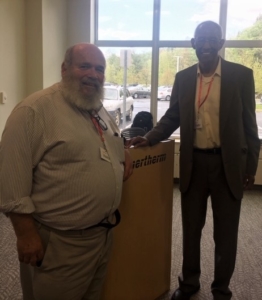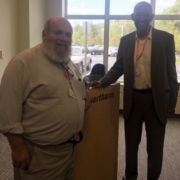A Workshop Explores Racism

Jim Wuelfing, left, and Art Woodard lead a Racism of the Well-Intended workshop at Hypertherm in Lebanon, New Hampshire.
On May 20, 2019, The Public Health Council of the Upper Valley and the Hypertherm HOPE Foundation presented a free full-day public workshop, Racism of the Well-intended: Examining Privilege and Power.
“Racism of the Well-intended.” It’s a somewhat unusual title for a workshop, which is why presenters Art Woodard and Jim Wuelfing asked 100 participants in Hypertherm’s conference room to spend 15 minutes thinking about how to define the term. Many came up with a definition for racism similar to the presenters’: “any attitude, action or institutional structure which lessens or denies the power to be or do of a person or group because of their race.”
Participants seemed to struggle, though, with the term “well-intended” in this context. As the workshop progressed, we explored the meanings behind these words. We discussed microaggressions: verbal, nonverbal, or environmental communications that contain a hidden insult to the target group to which it is directed. We explored the concept of white privilege in an exercise that feminist and anti-racism activist Peggy McIntosh calls, “Unpacking the Invisible Knapsack.”
A Training Born of Friendship
Art and Jim, who have been friends for decades, offer Racism of the Unintended workshops to organizations throughout the United States. They hope the presentations serve as a model for changing relationships between people.
As part of their work, the two men conduct field studies together in which Jim, who is white, is attuned to the injustices Art, who is black, faces in daily life. In the same convenience store, Jim is not asked to show his driver’s license when he makes a credit card purchase, while Art carries a license with him at all times, as well as two other forms of ID. Jim has witnessed Art get harassed by clerks in stores and followed by police in his car. I found it heartbreaking to hear about this inequality, but I would be naïve if I didn’t think it existed: I read about it every day in the news. And just because I don’t have the opportunity to interact with many people of color in our mostly white Upper Valley community, doesn’t mean that the scourge of racism doesn’t affect me, or that it doesn’t affect my community: Since we live in the United States, we live in a racist society.
Several people in the training wondered how best to explore the topic of racism in an area that isn’t racially diverse. Indeed, most of the participants at the workshop were white, and when we broke into smaller discussion groups throughout the day, I discussed heavy topics with others who, like me, were white. I felt I couldn’t fully explore some of the issues at hand because I couldn’t hear the perspective of someone who had experienced them first-hand. I also felt left off the hook for something I often fear when I’m in a diverse gathering: that I may hurt or offend somebody when we try to have an honest conversation.
We All Have Different Identities
The most powerful exercise of the day was when Art and Jim asked all participants to stand around the conference room in a circle. They told us they would name different identities, and if we claimed the identity they called, we were to walk to the center of room. Once there, we were to notice what we were feeling, notice who else was in the center of the room with us, and notice who was standing on the outside of our marginalized group. If we identified with one of the groups called and chose not to walk to the center, we were to take note of that, too, and consider why we kept our status hidden.
Jim began to call out marginalized identities: “If you are a woman, walk to the center of the room…”. He continued to read about 20 more identities. “If you have ever been treated for a mental illness, walk to the center of the room”; “if you were raised by a single parent…”; “if you or someone in your family identifies as LGBTQ+, walk to the center.”
I noticed I felt scared, at first, to publicly acknowledge my marginalized status in some of these categories—especially since we live in a small community. Many people in the room knew me personally but didn’t necessarily know these details about my life. Once I was in the center of the room with others in my group, though, I felt a sense of belonging within the minority.
It became easier, I felt stronger, to walk up each time to claim my marginalized status. While I was there, I noticed the people standing on the outside, and I felt somewhat exposed. I felt the others were lucky, in a sense, not to experience my particular hardship. But later, when I observed them walk to the room’s center under a category under which I didn’t fall, I was reminded of the feelings of my own marginalized status, and I felt connected to these people, even though I now stood on the outside.
The starkest examples were when Jim called for groups including African Americans, and Asian Americans, and only two or three participants stood alone in the center, surrounded by almost 100 people. I thought of how vulnerable those in the center looked: just a couple of people—surrounded by so many others. I also considered, since these were topics of race, these individuals could not choose to hide their identity: it is something that can be seen by all.
I was reminded of this image later that week when I read a column in the Valley News by Deb Beaupre about how a hateful object made her feel unsafe as an African American woman in our community. I recalled the sense of connection I felt that day in the training as participants walked back and forth, together in our very differences, united in our humanity. It was a feeling of compassion I will strive to carry with me.
Elizabeth Kelsey is a writer who specializes in mental health topics.
www.elizabethkelsey.com





ThankU Elizabeth for PowerFull & WonderFull summary of Racism Of The Well Intended!!! I’m impressed with insightful & accurate depiction our effort to make a difference. No doubt your Article makes a difference in my life and a feeling of being heard & understood- for a change. ThankU again for being an ally. Art Woodard